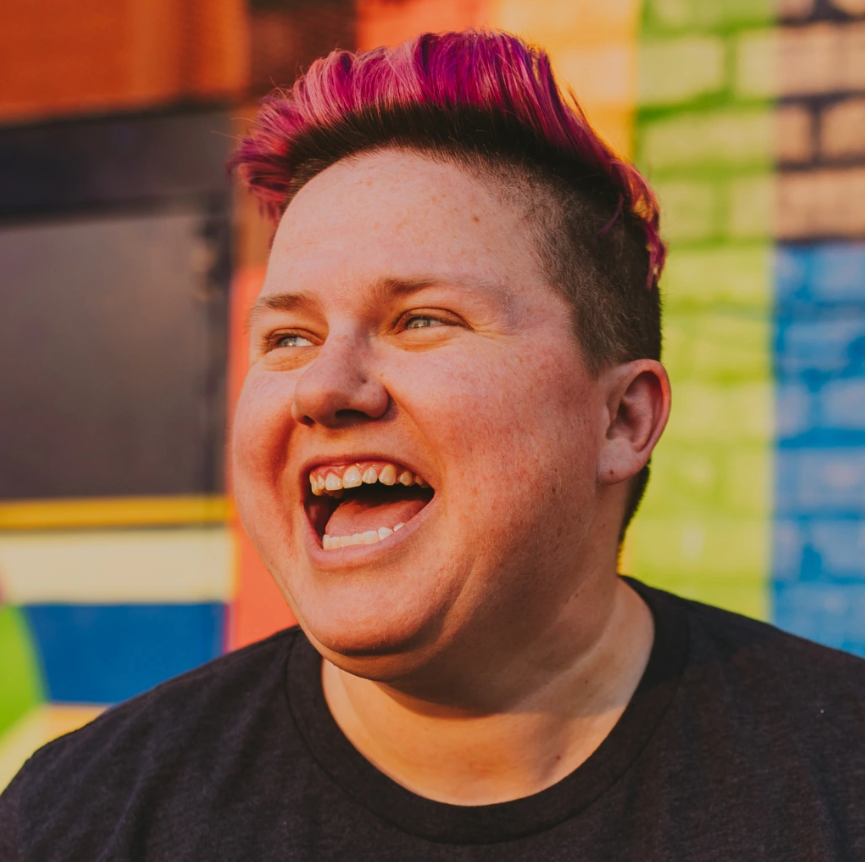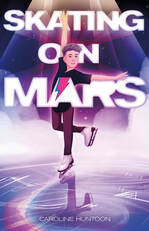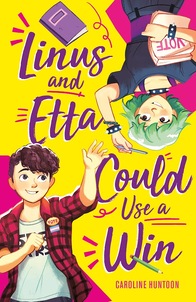| Caroline Huntoon (they/them) is a non-binary storyteller and educator and the author of Skating on Mars and the forth-coming Linus and Etta Could Use a Win (2024) and Piper Goes Overboard (2025), all from Feiwel and Friends/Macmillan. By day they work as an English teacher and theater director, and by night they write stories for young people about loss, identity, and friendship that validate their messy and wonderful lives. Find out more about Caroline and their work at carolinehuntoon.com. Rapunzel Reads: Too often, in the debate about trans kids in sports, nonbinary kids get forgotten entirely--but Skating on Mars filled this gap with all the determination and righteous anger I could wish for. What inspired Mars's journey against this unforgiving backdrop, and what would you suggest to young people facing the same challenges as them? Caroline Huntoon: We have to acknowledge that there are systems in our world that don’t work for everyone. Sometimes, it’s hard for people to see that—particularly if they are benefiting from those systems. With Skating on Mars, I | Author photo credit: Hannah Holland |
| wanted to paint a very clear picture of a time when a system in our world works against nonbinary kids, and I wanted to give my main character as much agency and voice as I possibly could. I really hope that this story reminds young people of their own power and allows them to see themselves as agents to change while still recognizing that change is often slower than we would like. RR: What inspired Skating on Mars? CH: Every month, I make a concept map of things that I’m thinking about—quotes, stories, tropes, random animals, tarot cards, whatever! A lot of my book ideas come from grabbing a few of those things and mixing them together. Skating on Mars combines figure skating, working through grief, the music of David Bowie, and exploring gender expression — all things that were on one of those concept maps. RR: What's your favorite thing about being an author? |
RR: One of my favorite parts of Skating on Mars was Mars themself, who was such a layered and relatable character that I couldn't help but fall in love with them. How did you go about creating Mars (and the entire cast)? Do you have a favorite character?
CH: There were some early facets of Mars’ character that clicked right away. They’re competitive nature and their confidence were both right there from the beginning. The rest of Mars filled in as I wrote. Putting a character into lots of different, sometimes unfamiliar, situations can reveal pieces of that character, even if you don’t end up using that scene in the final story.
RR: Too often, middle-grade books focus on a single 'issue' and neglect to fully develop the many competing challenges and story-lines that make up everyday lives, but Skating on Mars does the exact opposite. What are your thoughts on creating such multilayered stories?
CH: I think one of the most interesting things about writing stories is taking lots of different issues and elements and finding how they work (or don’t work) together. The moments of tension between those ideas often grow into great moments in the story. With Skating on Mars, I put competitive sports, nonbinary identity, and grief in conversation with one another, and the conversations and moments that that combination yielded were really powerful.
RR: What are you planning on writing next?
CH: Well, my next book, Linus and Etta Could Use a Win hits shelves in May. It’s about a girl who makes a bet that she can get the new student at her school—a shy, trans boy—elected student council president, but a real friendship grows between the two of them. Beyond that, I’m working on edits Piper Goes Overboard, which is basically a reverse Parent Trap on a cruise ship with queer leads.






 RSS Feed
RSS Feed
